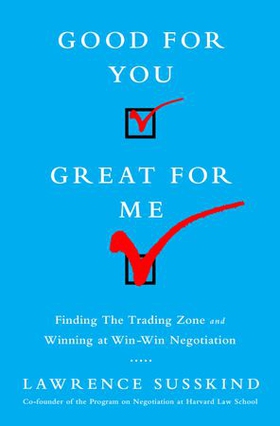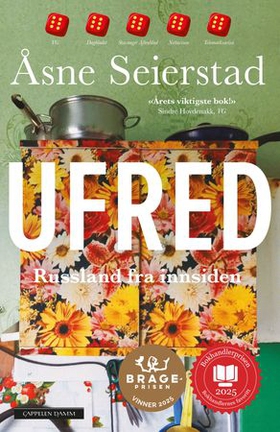
Legg til i ønskeliste
Les gratis utdrag
Good for You, Great for Me ebok
139,-
You've read the classic on win-win negotiating, Getting to Yes but so have they, the folks you are now negotiating with. How can you get a leg up and win?"Win-win" negotiation is an appealing idea on an intellectual level: Find the best way to convince the other side to accept a mutually beneficial outcome, and then everyone gets their fair share. The reality, though, is that people want more than their fair share; they want to win. Tell your boss that you've concocted a deal that gets your com…
Undertittel
Finding the Trading Zone and Winning at Win-Win Negotiation
Forlag
PublicAffairs
Utgitt
27 april 2017
Sjanger
Språk
English
Format
epub
DRM-beskyttelse
LCP
ISBN
9781610394260
You've read the classic on win-win negotiating, Getting to Yes but so have they, the folks you are now negotiating with. How can you get a leg up and win?
"Win-win" negotiation is an appealing idea on an intellectual level: Find the best way to convince the other side to accept a mutually beneficial outcome, and then everyone gets their fair share. The reality, though, is that people want more than their fair share; they want to win. Tell your boss that you've concocted a deal that gets your company a piece of the pie, and the reaction is likely to be: "Maybe we need to find someone harder-nosed than you who knows how to win. We want the whole pie, not just a slice." However, to return to an earlier era before "win-win" negotiation was in fashion and seek simply to dominate or bully opponents into submission would be a step in the wrong direction -- and a public relations disaster.
By showing how to win at win-win negotiating, Lawrence Susskind provides the operational advice you need to satisfy the interests of your back table -- the people to whom you report. He also shows you how to deal with irrational people, whose vocabulary seems limited to "no," or with the proverbial 900-pound gorilla. He explains how to find trades that create much more value than either you or your opponent thought possible. His brilliant concept of "the trading zone" -- the space where you can create deals that are "good for them but great for you," while still maintaining trust and keeping relationships intact -- is a fresh way to re-think your approach to negotiating. The outcome is often the best of both possible worlds: You claim a disproportionate share of the value you've created while your opponents still look good to the people to whom they report.
Whether the venue is business, a family dispute, international relations, or a tradeoff that has to be made between the environment and jobs, Susskind provides a breakthrough in how to both think about, and engage in, productive negotiations.
"Win-win" negotiation is an appealing idea on an intellectual level: Find the best way to convince the other side to accept a mutually beneficial outcome, and then everyone gets their fair share. The reality, though, is that people want more than their fair share; they want to win. Tell your boss that you've concocted a deal that gets your company a piece of the pie, and the reaction is likely to be: "Maybe we need to find someone harder-nosed than you who knows how to win. We want the whole pie, not just a slice." However, to return to an earlier era before "win-win" negotiation was in fashion and seek simply to dominate or bully opponents into submission would be a step in the wrong direction -- and a public relations disaster.
By showing how to win at win-win negotiating, Lawrence Susskind provides the operational advice you need to satisfy the interests of your back table -- the people to whom you report. He also shows you how to deal with irrational people, whose vocabulary seems limited to "no," or with the proverbial 900-pound gorilla. He explains how to find trades that create much more value than either you or your opponent thought possible. His brilliant concept of "the trading zone" -- the space where you can create deals that are "good for them but great for you," while still maintaining trust and keeping relationships intact -- is a fresh way to re-think your approach to negotiating. The outcome is often the best of both possible worlds: You claim a disproportionate share of the value you've created while your opponents still look good to the people to whom they report.
Whether the venue is business, a family dispute, international relations, or a tradeoff that has to be made between the environment and jobs, Susskind provides a breakthrough in how to both think about, and engage in, productive negotiations.






